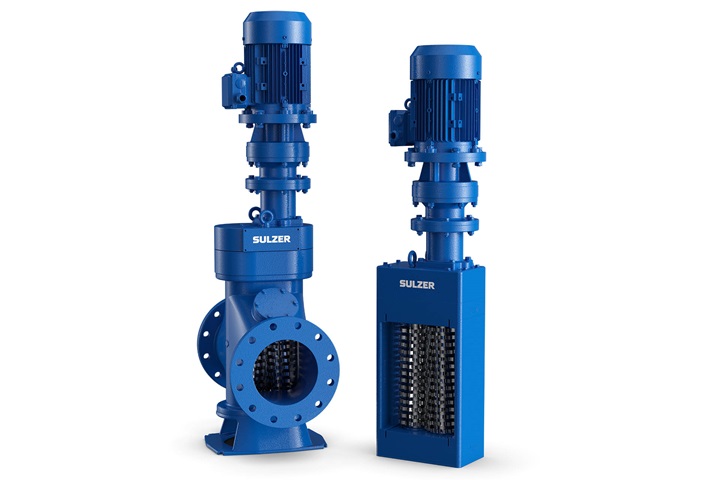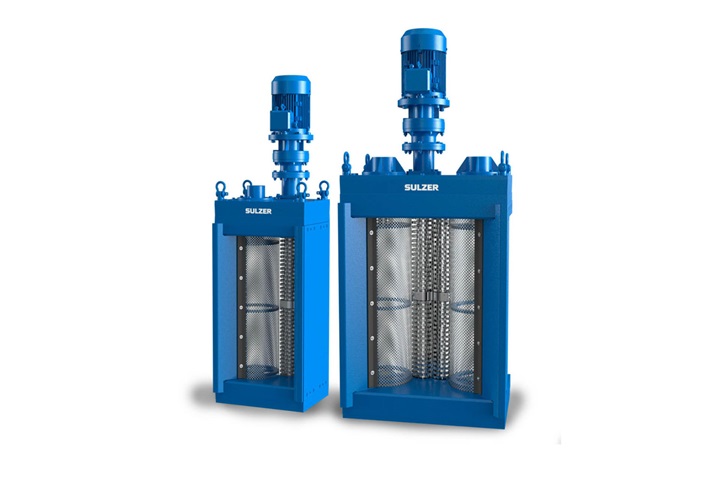Powerful grinder breaks down problematic solids
Muffin Monster prevents sewage pumps from clogging
Solids in the sewage cost man-hours
Aarhus Vand, a Danish wastewater company, experienced major challenges at one of its pumping stations. The pumping station receives sewage from industrial plants as well as from residential housing.
Aarhus Vand had a very hard time keeping the pumping station running normally due to solids in the sewage, such as strips of cloth and wipe-like components with long fibers. They had to clean the debris lodged in front of the pumps with a vacuum tanker once a month and closely monitor the station to avoid problems. This work has cost them many man-hours.
In addition to clogged pumps, the company also experienced major problems arising from hydrogen sulfide buildup and its associated odors. Because of the solids in the water, a ‘lid’ or ‘cushion’ of unwanted material formed at the top of the water. When this layer starts to rot, it generates hydrogen sulfide and creates severe odor problems, resulting in a very difficult working environment.
Grinding solids with the Muffin Monster
With its Muffin Monster range, Sulzer provided the solution to the problems at the pumping station. The Muffin Monster products are very powerful grinders with dual shafts, equipped with ‘teeth’ that can break down problematic solids in the sewage to a size that allows them to pass through a pumping station without causing issues.
“We’ve had the Muffin Monster solution in operation for about five months, and the preliminary results have been very positive and promising. None of the pumps have faced the problems they used to, and as a bonus, the ‘cushion’ of solids at the top of the water has disappeared along with the associated odor nuisance. In other words, we’re very pleased with the new solution, which has also resulted in major savings in cleaning the pumps,” said Ole Pedersen, Team Leader at Aarhus Vand.
No cure – no pay
As part of a framework agreement with Aarhus Vand, Sulzer installed the Muffin Monster solution at the pumping station at no charge to start with. Aarhus Vand would only have to pay for the solution if it worked – and it did.
“With our budgets, you don’t say no to a ‘no cure - no pay’ offer. I must admit I was a little skeptical at first, but now the pumps are running without problems, and the hydrogen sulfide has disappeared,” said Pedersen.
Fibers strangle pumps
In 2018, Sulzer acquired JWC Environmental which designs and manufactures the market leading Muffin Monster range. JWC has installed more than 20’000 Muffin Monster solutions, primarily in the US. This acquisition allows Sulzer to offer its customers a completely new type of solution to problems relating to clogged pumping stations.
“To a large extent, the problems are due to toilets being used as bins for things that shouldn’t be thrown in the toilet but into an ordinary waste bin. We find a lot of wet wipes and solids of that nature in the sewage,” explained Kenneth Larsen, Technical Manager at Sulzer.
Pumps are not built to handle plastic waste with long fibers. The plastic fibers get tangled in the pumps’ impellers, and when the ball of fiber grows to a certain size, the pumps grind to a halt. Authorities run info campaigns to change this behavior, but the volume of unwanted waste in the sewage does not seem to be decreasing. At the same time, the sewage flow is declining due to water-efficient toilets and the separation of rainwater and sewage. As a result, the proportion of solids in the flow is increasing, which is an issue for many sewage companies. This is where the Muffin Monster grinder offers a solution.
More stable operation
The preliminary operating results from the Monster Muffin solutions deployed at two Danish customers are so good that Sulzer anticipates a lot of interest among Danish sewage companies.
“We can see several benefits in the form of more stable operation, financial savings and a better working environment, so we will look into whether we could benefit from more grinders in our facilities. The Muffin Monster seems to be able to solve some very specific problems for which we have not been able to find a solution until now,” said Pedersen.



